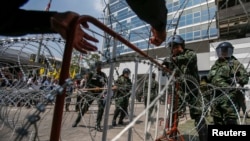Thai police have arrested a top leader of anti-government protests.
Police say they arrested Sonthiyarn Cheunruethainaitham on charges of violating Thailand's emergency law.
Department of Special Investigations director-general Tharit Pengdit said police will continue arresting protest leaders who violate the special law. Authorities say arrest warrants have been issued for 19 leaders of Thailand's anti-government protests.
Elsewhere in the Thai capital Monday, six street cleaners were injured, two seriously, by a small improvised bomb or a giant firecracker at a protest site.
And earlier, hundreds of farmers rallied outside Thailand's Justice Ministry in Bangkok to demand overdue payment for rice sold in a government subsidy program.
Disruption by anti-government protesters of the February 2 snap election prevented voting from being completed in many locations. That means the government remains a caretaker administration with limited spending powers until vacant seats in parliament can be filled.
The rice subsidy program, along with other populist policies, won the support of farmers, which helped Prime Minister Yingluck Shinawatra's party a landslide election in 2011.
The anti-government protest movement, which is trying to topple the prime minister, is supported by the urban middle class who are angered by what they say is waste and corruption in the rice program.
At least 10 people have been killed and scores hospitalized during the political upheaval.
Police say they arrested Sonthiyarn Cheunruethainaitham on charges of violating Thailand's emergency law.
Department of Special Investigations director-general Tharit Pengdit said police will continue arresting protest leaders who violate the special law. Authorities say arrest warrants have been issued for 19 leaders of Thailand's anti-government protests.
Elsewhere in the Thai capital Monday, six street cleaners were injured, two seriously, by a small improvised bomb or a giant firecracker at a protest site.
And earlier, hundreds of farmers rallied outside Thailand's Justice Ministry in Bangkok to demand overdue payment for rice sold in a government subsidy program.
Disruption by anti-government protesters of the February 2 snap election prevented voting from being completed in many locations. That means the government remains a caretaker administration with limited spending powers until vacant seats in parliament can be filled.
The rice subsidy program, along with other populist policies, won the support of farmers, which helped Prime Minister Yingluck Shinawatra's party a landslide election in 2011.
The anti-government protest movement, which is trying to topple the prime minister, is supported by the urban middle class who are angered by what they say is waste and corruption in the rice program.
At least 10 people have been killed and scores hospitalized during the political upheaval.






